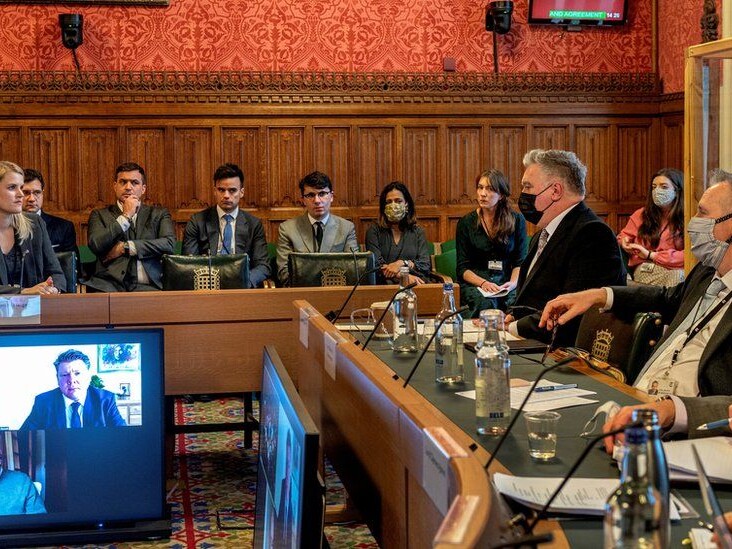During the passage of the Product and Security Bill it has become clear that the Government’s rollout strategy keeps being changed and is unlikely to achieve its objectives, especially in rural areas. This is what I said when supporting a review.
We all seem to be trapped in a time loop on telecoms, with continual consultations and changes to the ECC and continual retreat by the Government on their 1 gigabit per second broadband rollout pledge. In the Explanatory Notes, we were at 85% by 2025; this now seems to have shifted to 2026. There has been much government bravado in this area, but it is clear that the much-trumpeted £5 billion announced last year for project gigabit, to bring gigabit coverage to the hardest-to-reach areas, has not yet been fully allocated and that barely a penny has been spent.
Then, we have all the access and evaluation amendments to the Electronic Communications Code and the Digital Economy Act 2017. Changes to the ECC were meant to do the trick; then, the Electronic Communications and Wireless Telegraphy (Amendment) (European Electronic Communications Code and EU Exit) Regulations were heralded as enabling a stronger emphasis on incentivising investment in very high capacity networks, promoting the efficient use of spectrum, ensuring effective consumer protection and engagement and supporting the Government’s digital ambitions and plans to deliver nationwide gigabit-capable connectivity.
Then we had the Future Telecoms Infrastructure Review. We had the Telecommunications Infrastructure (Leasehold Property) Act—engraved on all our hearts, I am sure. We argued about the definition of tenants, rights of requiring installation and rights of entry, and had some success. Sadly, we were not able to insert a clause that would have required a review of the Government’s progress on rollout. Now we know why. Even while that Bill was going through in 2021, we had Access to Land: Consultation on Changes to the Electronic Communications Code. We knew then, from the representations made, that the operators were calling for other changes not included in the Telecommunications Infrastructure (Leasehold Property) Act or the consultation. From the schedule the Minister has sent us, we know that he has been an extremely busy bee with yet further discussions and consultations.
I will quote from a couple of recent Financial Times pieces demonstrating that, with all these changes, the Government are still not achieving their objectives. The first is headed: “Broadband market inequalities test Westminster’s hopes of levelling up: Disparity in access to fast internet sets back rural and poorer areas, data analysis shows”. It starts:
“The UK has nearly 5mn houses with more than three choices of ultrafast fibre-optic broadband, while 10mn homes do not have a single option, according to analysis that points to the inequality in internet infrastructure across Britain.
While some parts of the country are benefiting from high internet speeds, others have been left behind, according to research conducted by data group Point Topic with the Financial Times, leading to disparities in people’s ability to work, communicate and play.”
A more recent FT piece from the same correspondent, Anna Gross, is headed: “UK ‘altnets’ risk digging themselves into a hole: Overbuilding poses threat to business model of fibre broadband groups challenging the big incumbents”. It starts:
“Underneath the UK’s streets, a billion-pound race is taking place. In many towns and cities, at least three companies are digging to lay broadband fibre cables all targeting the same households, with some areas predicted to have six or seven such lines by the end of the decade.
But only some of them will cross the finishing line … When the dust settles, will there be just two network operators—with Openreach and Virgin Media O2 dominating the landscape—or is there space for a sparky challenger with significant market share stolen from the incumbents?”
Are we now in a wild west for the laying of fibre-optic cable? Will this be like the energy market, with great numbers of companies going bust?
By contrast, INCA, the Independent Networks Cooperative Association, reports in its latest update:
“The ‘AltNets’ have more than doubled their footprint year on year since 2019”—
I think my noble friend Lord Fox quoted these figures—
“now reaching 5.5m premises and expected to reach 11.5m premises by the end of this year. Investment remains buoyant with an additional £5.7bn committed during 2021 bringing total estimated investment in the independent sector to £17.7bn for the period to 2025.”
We have two very different stories there. What contingencies have the Government made? Who will pick up the tab if the former scenario is correct—the poor old consumer? In any event, will rural communities get any service in the end?
What of rural broadband rollout? It appears that DCMS is currently assessing policy options on the means of best addressing the shortfall. I was interested to hear the very pointed question that the noble Baroness, Lady Merron, asked about what working groups were examining some of these issues, following a call for evidence on improving broadband for very hard-to-reach areas. What is the department actually doing? Can we expect more changes to the ECC?
The policy justification for the 2017 reforms was that rent savings by operators would be reinvested in networks, with the then Minister saying that the Government would hold operators’ feet to the fire to ensure that they delivered, noting that to
“have real impact, savings must be invested in expanding network infrastructure”.—[Official Report, 31/1/17; col. 1157.]
and saying that the revised code secured real investment. This was supported by confirmation, in the impact assessment accompanying the reforms to the ECC in 2017, that the Government would review the impact of the policy by June 2022. But this has not been met, despite the Government’s future infrastructure review confirming that they were already considering undertaking a formal review of the code reforms to assess their impact in 2019. The Government’s decision to introduce new legislation proves that the 2017 reforms have not actually achieved their aims.
Instead of leading to faster and easier deployment, as we have heard today, changes to the rights given to operators under the code have stopped the market working as it should and led to delays in digital rollout, as well as eroding private property rights. This has resulted in small businesses facing demands for rent reductions of over 90%; a spike in mobile network operators bringing protracted litigation; failure by mobile operators to reinvest their savings in mobile infrastructure; and delayed 5G access for up to 9 million people, at a cost of over £6 billion to the UK economy. The Government’s legislation and their subsidies now show they know the reforms have failed. That is why they are passing new legislation to revise the code, as well as announcing £500 million in new subsidies for operators through the shared rural network.
In Committee in the other place, the Minister, Julia Lopez, claimed:
“If a review takes place, stakeholders will likely delay entering into agreements to enable the deployment of infrastructure. Only when the review has concluded and it is clear whether further changes are to be made to the code will parties be prepared to make investment or financial commitments”.—[Official Report, Commons, Product Security and Telecommunications Infrastructure Bill Committee, 22/3/22; col. 122.]
In addition to there being no evidence for this claim, this extraordinary line of reasoning would allow the Government to escape scrutiny and commitments in a wide variety of policy areas, were it applied more broadly. To maintain public faith in policy-making, it is vital that there is an accessible evidence base on which decisions are made. The Government’s decisions in this Bill do not meet the standard.
Moreover, I know that Ministers are sceptical about the Centre for Economics and Business Research’s report. The noble Lord, Lord Parkinson, has said that it oversimplifies the issue, but I do not believe that the Government have properly addressed some of the issues raised in it. The CEBR is an extremely reputable organisation and although the research was commissioned by Protect and Connect, the Government need to engage in that respect.
Our amendment would insert a new clause obliging the Government to commission an independent review of the impact of the legislation and prior reforms within 18 months. The review would assess the legislation’s impact on the rate of additional investment in mobile networks and infrastructure deployment, the costs borne by property owners and the wider benefit or costs of the legislation. It would also oblige the Government to publish a response to the review within 12 weeks of its publication and lay that before Parliament, to ensure parliamentary accountability for the Government’s action and to allow debate.
Another amendment would insert a new clause placing obligations on operators to report certain information to Ofcom each year. Operators would have to report on such information as their overall investment in mobile networks, the rent paid to site providers, the number of new mobile sites built within the UK, and upgrades and renewals.
It is the final group in Committee, so where in all this—as my noble friend Lord Fox and I have been asking each time we debate these issues—are the interests of the consumer, especially the rural consumer? How are they being promoted, especially now that market review is only once every five years? That is why we need these reviews in these amendments. We tried in the last Bill to make the Government justify their strategy. Now it is clear that changes to the ECC are not fit for purpose and we will try again to make the Government come clean on their strategy.
10th September 2021
Opening the new AI and Innovation Centre at Buckingham University
6th April 2021






